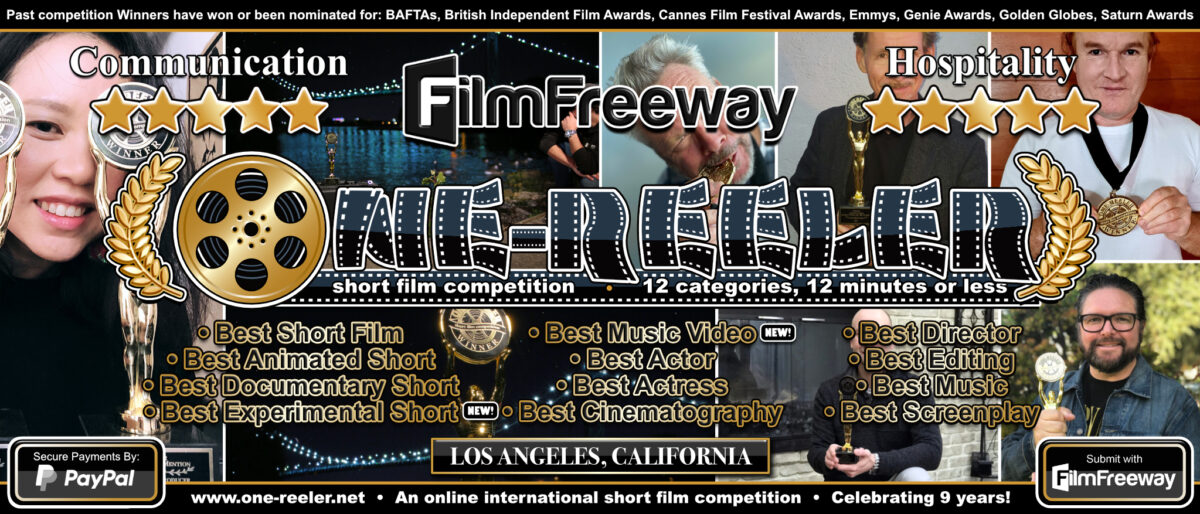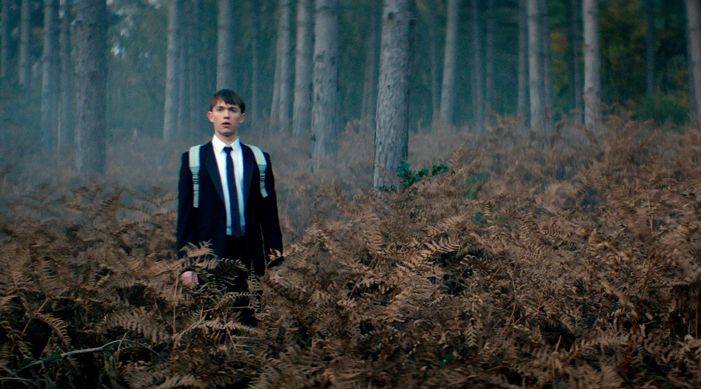Best Short Film Winners receive our stunning 11 1/2″ 24K custom gold statuette which is manufactured by R.S. Owens, the same company that manufactured the Oscar for 30 years! All Winners can purchase the award via our online Awards Order Form HERE.

[tabslide]

Title: Into the Surf
Runtime: 12 min
Country: UK
Director: Tom Evans
Placement: Award of Excellence + Best Cinematography + Best Music
Synopsis: A short film about Sebastian, a young man who always lived in the shadow of his older brother – until his brother became ill and Sebastian had to find his own voice.
OR: What was the inspiration for your film?
TE: The film was actually inspired by a photograph by Martin Munkácsi, entitled ‘Boys running into the surf at Lake Tanganyika’ (hence the film’s title ‘Into the Surf’). Munkasci is one of my favourite photographers and he is well-known for his ability to capture dynamism on camera (he was a renowned sports photographer, among many other things).
I began to imagine someone looking at the photograph, with a sense of longing, like they were looking at their own past, when life was more dynamic. Who might these boys be? Why is life not so dynamic now?
Well. It was a long journey from there to here. I think the other factors that shaped where we ended up, include my love of coming-of-age films, a genre within which I would like to direct a feature at some stage; also my specific interest in the issue of when young people are forced to grow up too young; and with my background as a documentary director, I think I’m hard-wired to tackle social issues and one of the most profound issues for young boys at this age, is mental health. All of the above led me to create a memory-driven film about a young man, trying to come to terms with his own brother’s mental health deterioration.
And the rest, as they say, is history.
OR: When did you conceive the idea for your film and how long did it take before it was realized?
TE: I conceived the idea for the film in 2012 and the film was only finished in February 2015, so it took a long time to write and produce. This is often the case with short films, when you’re relying on the generosity of skilled people who ply their trade for a living and your project will, very understandably, have to fit around their paid commitments.
OR: What was the most challenging aspect of working in a short film format?
TE: The list is almost endless, as it’s one of the most challenging formats to work in. Many people see making short films as an easy alternative to making a feature. In many ways this is true but the short film can also be much harder. To try and engage an audience, establish an emotional connection to your characters and tell a story that resonates way beyond its small confines, all within a very short period of time is incredibly difficult. It’s all about telling a big story in a short period of time. That’s the challenge and people go about it in very different ways. Some like to restrict themselves in scope (either time, or space), others like to try and create a microcosm, a small story that represents something much bigger, or my favourite approach, to tell what appears to be a very small, specific story but is actually universal and it’s meaning resonates long after the credits roll.
For me, I wanted to try something a little different, so I decided to use what I think of as the ‘iceberg’ approach. By selecting only key scenes from the main character’s life, I would show only the ‘tip of the iceberg’. For the rest of the story, the audience would have to fill in the blanks themselves, naturally making it personal to them – open to interpretation if you like. This way, we were able to tell a much bigger story than would usually be attempted in the short film medium.
I decided to also utilise a split narrative, carefully constructing and connecting the scenes, out of any chronological order but in a way that builds and reveals the story to the audience in a way that keeps them thinking about the subject-matter.
It’s not the easiest film to watch but I hope it’s one that gets people to reflect on and engage with some difficult themes, ones that wouldn’t usually be covered in mainstream entertainment.
OR: What was the most challenging aspect of your production?
TE: As is the case with most short films, the people we collaborated with, did it for free. This was because they believed in the script (see below advice!) and our vision for the film but of course, trying to balance getting the film made with their paid work, was very difficult. It’s incredibly frustrating because the project continually gets put ‘on the shelf’ and it takes an enormous amount of perseverance to keep pushing everything forward. Sadly many short films don’t make it to the finish line because of this but I was lucky and had a fantastic producer, Rebecca Mills, at my side. Whenever I would flounder, she would help push – and vice-versa. I think it’s really important to be able to share this load and getting yourself a gutsy, hard-working producer who is willing to push everything as hard as you, is incredibly important. It can be a lonely business, so surround yourself with as many passionate friends as possible.
OR: Do you have any advice for first-time filmmakers?
TE: All of the cliches are true: listen to them! The most important one is perfect your script before you move to the next stage. And be honest about it, only you (as the writer) know in your heart if the script still has room to be improved. If you have that horrible, niggling feeling in your belly that something’s not right, listen to it and attempt to rectify it, even if it means changing something you had your heart set on – ultimately, you’ll be very relieved that you did. It will likely take you in to new, uncharted territory that is far more fruitful than where you were clinging on to before.
It’s so much more important to get your film done right, than it is to simply get it done. It takes so much time, effort and money, not just on your part but the part of all of those who will assist you, so don’t ask this of people until you’re fully confident in your script – it’s the least you can do. Trying to set-off too early only ends one way and the further along the journey you are, the harder it is to rectify.
Get the script right, however long it takes!